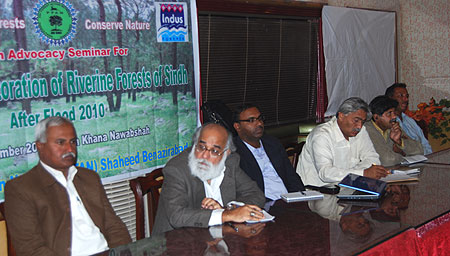
December 25, 2010
Flood has given an opportunity to revive the forest in Sindh and efforts should be made to rehabilitee the lost forest coverage in Sindh. This was expressed by the speakers at a seminar on revival and rehabilitation of Riverine forest after flood. The seminar was organized by Pai Forest Action Network in collaboration with WWF’s Indus for All Programme. Speaking on the occasion prominent environmental writer Badar Abro said that campaign to increase forest coverage in Sindh needs to be initiated on an emergency basis. He said that ideally forest coverage should be 25 percent of the total area of any country but unfortunately forest has been depleted at a fast pace in the country. He suggested that government together with civil society and other stakeholders should strive to increase forest coverage at least ten percent of the total area. Mr. Abro suggested to impose complete ban on the cutting of trees in Sindh, which is rampant now a days. He added that cutting of trees should be declared as crime and heavy penalty should be imposed on the violators. He said that many precious species of wildlife reported in forests of Sindh such as elephant, Rhinoceros, Panthar tigris, Balck Panther, Blue Bull and others are now extinct mainly due to habitat degradation. He said that remaining species of Sindh could be protected by banning hunting. He said that local community should also come forward to protect forest.
Programme Coordinator WWF Nasir Ali Panhwar said that Riverine forests of Sindh used to provide food and fiber to the country and added that contribution of forest to economic, ecological, social and cultural wellbeing of people was significant. He said that under the millennium development goals Pakistan is expected to increase seven percent forest coverage by 2015. He said that number of multilateral environmental agreements has been signed by Pakistan including MDGs, biodiversity convention and Ramsar convention and needs to be implemented in true spirit. He said that illegal bunds inside Indus River aggravated the situation and gave impetus to flood and such bunds should not be allowed in future. Panhwar said that WWF has provided support to Sindh Forest and Wildlife Department to revise Sindh Wildlife Ordinance 1972 and Forest Act 1927 and integrate new concepts of conservation. He said that WWF is also providing alternate energy sources such as biogas to community living around Pai forest to reduce the pressure on forest.
Prof. Mithal Jiskani of Sindh Agriculture University in his presentation said that Sindh needs to enhance its forest coverage not only in Riverine area but across the province. He said that free seed should be provided to the community for plantation and alternate livelihood sources be given to the community. He said that Hurri plantation should be promoted. Prof. Jiskani said that trees also get disease, which hamper its growth but there is not a single plant ecologist in the Forest department. Zain Daudpoto of Indus Development Organization said that flood is not disaster for Riverine area but by removing forest we have made it disaster for Riverine area. He said that flood has helped in removing illegal encroachment in Riverine area. He emphasized the need for mass movement to save forests of Sindh. He said that it is unfortunate that forest land is being used for non forest purposes. Nawaz Khumbhar said that government needs to change its policies and community participation in forest management needs to be given legal cover.
President of Pai Forset Action Network, Ameen Keerio said that 14 community based organizations of Pai area has formed a network to work for protection of Pai forest. He said that Riverine forest could be revived after flood and added that political will is required to save the forest of Sindh. Chakar Jalbani, Mumtaz Rahoo, Dilshad Ali Keerio, Nisar Ahmed Keerio, Qurban Shah, Rafique Jamali and others also spoke at the occasion.

For further Information:
Muhammad Zafar Khan
Manager Communications and Environmental Education
Contact: 0300-3495901
email: zafar.hilbi@gmail.com
|